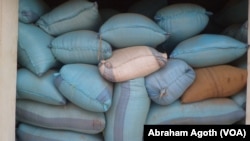A business cooperative in South Sudan is fighting hunger by selling basic foods for around half of what they usually cost.
Business owners affiliated with the South Sudan Cooperatives for Development and Investment provided nearly 12,000 bags of sorghum, 7,000 bags of wheat flour, 5,000 bags of sugar and 4,000 bags of lentils to distribution centers in Northern Bahr el Ghazal state.
When one of those centers opened in Aweil on Wednesday, a long line of residents was waiting to buy food at affordable prices.
Abuk Garang bought a bag of sorghum.
“We are very thankful to them for providing sorghum at 27 South Sudanese pounds. The previous prices were really high but these prices are fair," she said.
Chol Atak Lual, the branch director of the cooperative in Northern Bahr el Ghazal, said 100 bags of sorghum were distributed free of charge to people who most need food.
The World Food Program (WFP) said last month that 4.6 million people could go hungry in South Sudan in the next two months. WFP said food insecurity is growing worse in conflict and non-conflict areas in South Sudan.
Most of the food sold in South Sudan is imported or made from imported raw materials, both of which are paid for in U.S. dollars. The price of food has shot up in recent months as the dollar has strengthened against the pound.
The states and the central government have been trying to convince farmers to grow more food locally, to reduce the dependence on imported food. President Salva Kiir bought 1,000 tractors for farmers in the country's 10 states, to try to boost food production. The tractors were not delivered before the planting season, and insecurity is rife in rural areas, preventing people from farming.
Simon Tong Deng, the deputy mayor of Aweil, said the cooperative's initiative will help to bring down food prices because the plan fixes -- even if only temporarily -- the issue of supply, by shipping in large stocks of foods at cost, by selling those stocks at reduced prices.
Tong said the central government in Juba could also help to prevent hunger by improving the roads to allow food and other basic goods to be transported, even during the rainy season. At the moment, most of South Sudan’s roads are unpaved and become unpassable when the rains begin.




